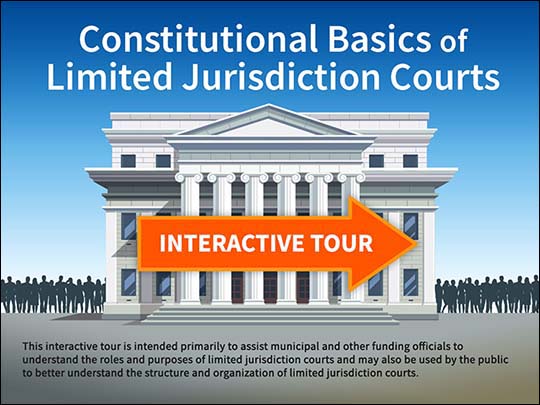What these courts do,
and what they're called
Limited Jurisdiction courts handle a variety of case types, and are known by many different names, depending on the state. Find out which cases they handle and what they are called using these visualizations.
Guide resources
Bench Books, manuals and guides
Collected here are examples of how state municipal courts explain and define their roles within larger judicial and government systems, as well as guides for how they handle specific topics like fines, fees and costs, criminal cases, etc.
Courts of limited jurisdiction offer a range of training to their judges and staff covering the issues they encounter, the processes they employ and the cases they adjudicate.

Efforts to improve Limited Jurisdiction courts
- In Missouri, in response to confusion and concern about how Missouri’s more than 500 municipal divisions have operated, a Municipal Working Group crafted 35 recommendations that were submitted on March 1, 2016, to the Supreme Court of Missouri. The Supreme Court took swift action to begin implementing these recommendations and adopted "Minimum Operating Standards for Municipal Divisions." Read more.
- In Georgia, annual reports on criminal justice reform are filed online. Read more.
- In South Carolina, municipal courts shall try or otherwise dispose of all non-jury criminal cases, including non-jury traffic cases within 60 days of the return of the charging paper to the court, in the absence of good cause shown to the court. The courts also shall try or otherwise dispose of all criminal cases, including traffic cases, in which a jury trial has been requested within 120 days of the return of the charging paper to the court, in the absence of good cause shown to the court. Read more.
- Procedures also were created in S.C. for the disposition of uniform traffic tickets and arrest warrants and the right to counsel, solely for defendants who are unrepresented by counsel and fail to appear on their court dates. Read more.
- In Washington, where local governments have authority over municipal courts, the non-profit Municipal Research and Services Center (MRSC) provides legal and policy guidance to local governments to better serve its citizens. MRSC provides these publications that explain the state's court improvement efforts. Read more.



